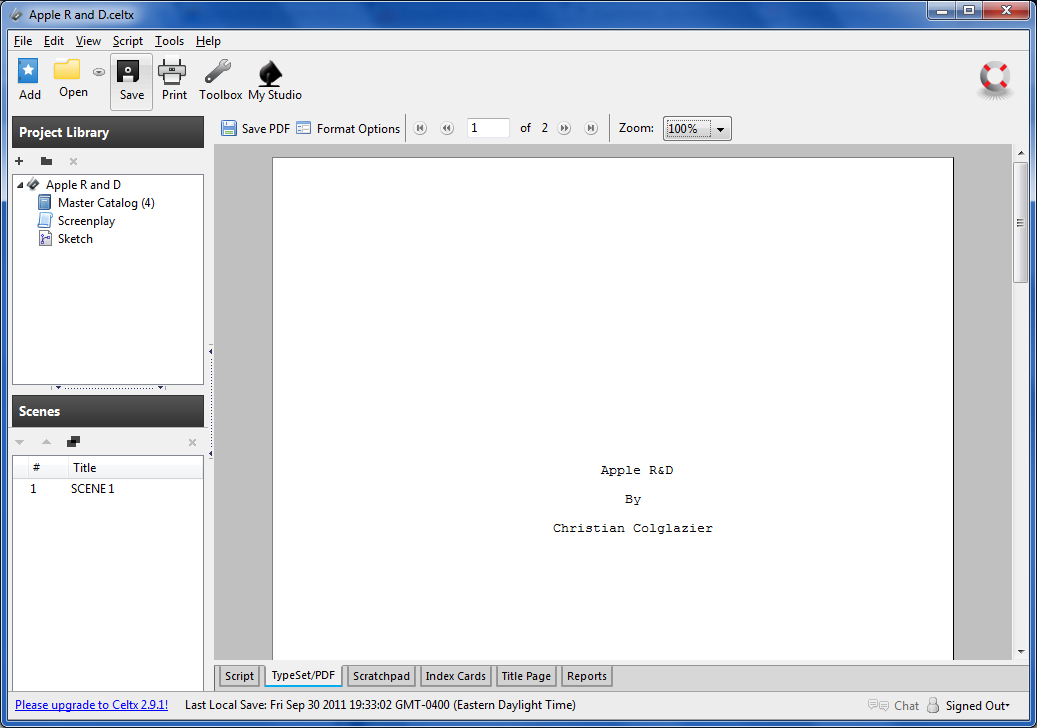
- #Celtx script badges mac os#
- #Celtx script badges full#
- #Celtx script badges license#
- #Celtx script badges download#
You can add catalogs for animal handlers, CGI, electrics, extras, construction, stunts, weapons… you name it, Celtx seems to be ready for it. The Oz template has a lot of the available features, but not all of them. When you’re happy with a script, go to the TypeSet/PDF tab and you’ll get a nifty printable version of your script to hand out to the cast and crew.Ĭlick the Add button in the toolbar and you’ll see all the available items. This allows you to set up the title page, create a report based on the scenes (useful for breaking down a shoot), a scratchpad to “park” text while you’re revising, and index cards for reshuffling plot bits. If you look at the screenplay tab, you’ll notice that there’s an additional set of tabs at the bottom. You can also add a storyboard to the library that has pictures and descriptions of each shot. You can also assign an actor to the character once they’re cast. Characters are also kept catalogued and you can describe their traits, motivation, and all the details needed for a casting director or actor playing the part.
#Celtx script badges full#
The actors, the characters, the props, locations, and scene details.įor actors and such, you’ll be able to keep their full personal details and dates of availability, description, and (most importantly for the props department) their sizes for wardrobe. The master catalog keeps details on all the elements you want for the production. When you open the template, you’ll see that it has a project library on the left, and a tabbed interface on the right that has the storyboard, production schedule, and the screenplay.Ĭheck the right-hand library and you’ll see a list of elements that you’ll need for the production.

You might notice that it has a similar feel to it, but the similarity pretty much ends with tabs and a similar feel to the “chrome” of the application. Let’s look at one of the samples, and open the Wonderful Wizard of Oz.Īs I mentioned, Celtx is based on Firefox. The choices should be fairly self-explanatory, and there’s too many to go into all of them. You’ll also see a list of sample projects on the right-hand side of the dialog. Here you can choose film, audio-visual, theatre, audio play, storyboard, comic book, or text. When you fire up Celtx the first time, you’ll see several project templates.

Now you’ll have a celtx directory, just cd to that directory and run. Of course the version number (2.7) will change, but I don’t expect the distribution method to change greatly.
#Celtx script badges download#
On Linux, download the tarball and uncompress it into the directory of your choice: tar -jxvf Celtx-2.7.tar.bz2 It is free as in beer (excepting some add-ons I’ll get to shortly) but may not be free as in speech.
#Celtx script badges license#
It’s based on the Mozilla Public License version 1.2, but with a few additions that I’m not sure qualify as compliant with the Open Source Definition. It may not be packaged for most Linux distros as the license is a bit odd.
#Celtx script badges mac os#
You can find Celtix downloads for Linux, Windows, and Mac OS X. I wouldn’t want to try to use it for a shell script, but it’s quite handy for the specific task of media pre-production. When it comes to the specifics of dealing with media pre-production, I haven’t seen a Linux-friendly tool that comes close to Celtx.

Usually, I’m a big fan of Vim for my writing needs - but I’m also a fan of using the right tool for the job. Writing the script, sketching out characters, scheduling the production, managing set pieces, and pretty much everything else you would need to manage. What do I mean by “media pre-production”? The prep that goes in before shipping a story, filming a screen play, or putting on a stage play. Based on Firefox, Celtx is an all-in-one tool for media pre-production. Want to write your story, create a screenplay, block out a storyboard, or create a comic? Put down the text editor, and pick up Celtx.


 0 kommentar(er)
0 kommentar(er)
